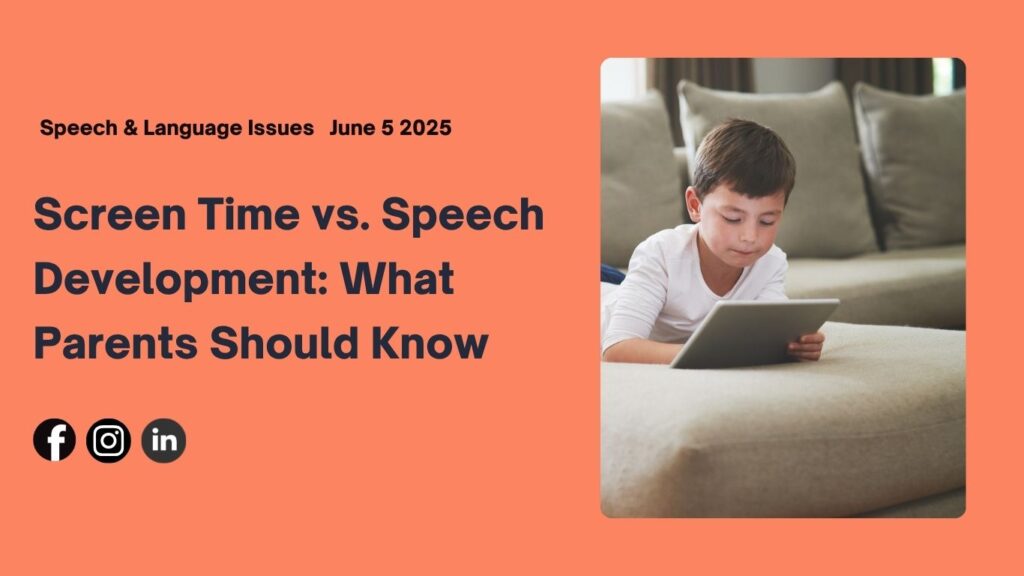
In today’s screen-saturated world — with TVs, tablets, smartphones, and even talking toys — it’s no surprise that many parents are asking:
“Is screen time affecting my child’s speech development?”
The honest answer? Yes, it can — especially when not used mindfully. But with the right balance, awareness, and habits, you can nurture strong communication skills in your child even in the digital age.
How Screen Time Can Impact Speech Development
Children learn to talk through real-life interactions — things like eye contact, turn-taking conversations, and responsive engagement. These human connections are essential in shaping early language skills.
When screen time replaces those meaningful interactions, it may hinder a child’s ability to develop speech and language effectively.
According to research published by the American Academy of Pediatrics and studies referenced by the World Health Organization, excessive screen use among children under 5 has been linked to:
- Reduced vocabulary
- Slower development of two-way conversation skills
- Difficulty in understanding and using new words³
Explore more about early speech challenges in our detailed article on stuttering causes and tips for Indian parents.
So, How Much Screen Time Is Okay?
The World Health Organization (WHO) and the American Academy of Pediatrics recommend:
- No screen time for children under 2 (except video chatting)
- Up to 1 hour per day of high-quality, age-appropriate content for children aged 2–5 — ideally with a caregiver present to explain and discuss what they’re seeing
Remember: It’s not just about the quantity of screen time, but the quality and context. Passive consumption (like endless videos) is far less helpful than interactive, co-viewed content that sparks discussion and imagination.
Signs Your Child’s Speech May Be Affected by Screen Time
If you’re wondering whether screen habits might be impacting your child’s communication, look out for these red flags:
- Shows more interest in screens than in people
- Avoids or loses interest in books and storytelling
- Struggles to follow simple directions
- Rarely uses new words or builds sentences
If these signs sound familiar, it may be time to consult a developmental expert. Learn more about early help at Neuronurture’s child development services.
Tips to Balance Screen Time and Boost Communication
You don’t have to ban screens entirely — but you can make small changes that support healthier screen habits:
- Co-watch and co-play: Discuss what’s happening on the screen in real time
- Choose low-stimulating content: Avoid highly stimulating shows like Cocomelon or Peppa Pig, which are designed to be addictive for toddlers. Pick calmer content where real-time discussion is possible.
- Model screen habits: Limit your own device use to encourage more family talk time
- Pick audio content: Age-appropriate stories, rhymes, or music are great screen-free ways to promote listening and comprehension
Explore more tips in our parenting resource center to stay informed and inspired.
When to Seek Professional Support
Every child is unique — but if your child:
- Isn’t meeting key speech milestones
- Seems to regress or stall in communication
- Prefers screens to speaking or socializing
…it’s time to take a closer look. Early intervention can make a tremendous difference in language, learning, and confidence.
At Neuronurture, our experts specialize in speech and developmental evaluations tailored for young children. We’ll guide you with empathy, clarity, and science-backed solutions.
Start your journey with a quick consultation form.
Balance Is the Key
Screen time doesn’t have to be the villain — but it should never replace rich, human interaction. Your words, your presence, and your attention are the most valuable tools in helping your child’s speech and language blossom.
If you’re unsure about your child’s speech development or screen habits, reach out to the team at Neuronurture for thoughtful guidance.
You’re not alone in this journey — and we’re here to help, every step of the way.
References
- World Health Organization. (2019). Guidelines on physical activity, sedentary behaviour and sleep for children under 5 years of age.
https://www.who.int/publications/i/item/9789241550536 - American Academy of Pediatrics. (2016). Media and Young Minds.
https://publications.aap.org/pediatrics/article/138/5/e20162591/60352/Media-and-Young-Minds - Madigan, S., Browne, D., Racine, N. et al. (2019). Association Between Screen Time and Children’s Performance on a Developmental Screening Test. JAMA Pediatrics.